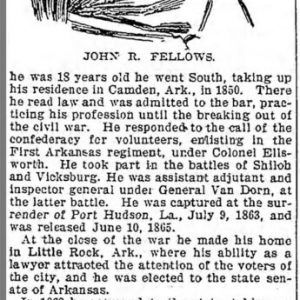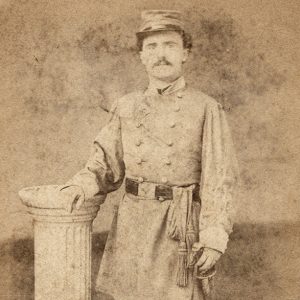calsfoundation@cals.org
John R. Fellows (1832–1896)
John R. Fellows was a lawyer, noted for his oratorial skills, in Camden (Ouachita County). He served in the Confederate army before moving to New York, where he was elected to the U.S. Congress.
John R. Fellows was born on July 29, 1832, in Troy, New York. He was one of seven children of Tisdale E. Fellows and Elizabeth Harris Fellows. In 1850, at age eighteen, he moved to Camden at the invitation of his uncle Daniel Fellows, who was a merchant there. He studied law in the offices of Judge Abner A. Stith and was admitted to the bar in 1855.
Fellows was a gifted orator, and when he was serving as a presidential elector for John Bell and Edward Everett on the Constitutional Union ticket in 1860, a Magnolia (Columbia County) man reported the following on a campaign rally to the Weekly Arkansas Gazette: “Fellows is quite young, and looks like a boy, but he talks like a Cicero. For one hour and a half he enchanted the audience with one of the most chaste, elegant, and argumentative speeches I have ever heard in the State. He strengthened the strong, confirmed the weak, and convinced many who were undecided.”
A Unionist, Fellows was a delegate in the secession convention in Little Rock in 1861. However, when Arkansas seceded from the Union, he enlisted as a private in the Camden Knights, Company C, First Arkansas Infantry Regiment in Little Rock on February 1, 1862. His service records describe him as five feet five inches tall with a ruddy complexion, brown hair, and hazel eyes.
Following the April 6–7, 1862, Battle of Shiloh in Tennessee, a correspondent wrote that “Fellows fought with the Camden Knights for two days—fought like a tiger and acquitted himself nobly,” which led the Washington Telegraph to editorialize: “Those who…were so much captivated with the eloquence of Fellows, pleading for the preservation of the old Union, will be proud to learn that he has…proven his devotion to the South when disunion was forced upon us by the base treachery of Lincoln’s Administration.”
On April 23, 1863, he joined the staff of Brigadier General William Beall with the rank of captain, serving as assistant inspector general. He was captured when Port Hudson, Louisiana, surrendered on July 9, 1863, and spent the rest of the war as a prisoner in Union camps in Ohio, Maryland, and Delaware. Fellows’s gift for oratory remained evident during his imprisonment. He spoke to a group of prisoners on George Washington’s birthday in 1864 in the Johnson’s Island prison camp, though the crowd was dispersed after he opened a sentence by saying, “While the stars and stripes exultantly wave in the land of the thief & the home of the knaves.” He took the oath of allegiance to the United States and was released on June 10, 1865.
Fellows returned to his law practice in Camden and, in 1867, married Lizzie M. Reynolds of Little Rock (Pulaski County); they had five children. Fellows served in the Arkansas Senate in 1866 and 1867. A delegate to the Democratic National Convention in 1868, he moved to New York City that same year and served as assistant district attorney in terms from 1869–1872 and 1885–1887. He was elected district attorney, serving from 1888 to 1890.
A Democrat, Fellows was elected to the U.S. House of Representatives and served from March 4, 1891, until he resigned from Congress on December 31, 1893. He returned to New York, where another term as district attorney began on January 1, 1894. He died on December 7, 1896, after a short illness.
A Black Rock, New York, newspaper wrote that Fellows “had been for years a well-known figure at state and national conventions, and his reputation as an orator extended throughout the country,” while the New York Times eulogized: “We think Mr. Fellows surpassed all the orators who have spoken to New York audiences in the last twenty-five years, whether in that superabundant common form of the art which is incident to occasions of conviviality and of ceremony or in the practical field of political speaking.”
Fellows is buried in Trinity Church Cemetery in New York City.
For additional information:
Biographical Directory of the American Congress, 1771–1961. Washington DC: Government Printing Office, 1961, p. 880.
“Col. John R. Fellows Dying.” Brooklyn Daily Eagle, December 6, 1896, p. 28.
“Death of Colonel Fellows.” [Black Rock, New York] International Gazette, December 12, 1896, p. 7.
“Fellows Is Dead.” [Brooklyn, New York] Standard Union, December 7, 1896, p. 1.
“From Columbia County.” Weekly Arkansas Gazette, September 29, 1860, p. 2.
“John R. Fellows as an Orator.” New York Times, December 13, 1896, p. 12.
Pickenpaugh, Roger. Captives in Gray: The Civil War Prisons of the Union. Tuscaloosa: University of Alabama Press, 2009.
Mark K. Christ
Central Arkansas Library System







Comments
No comments on this entry yet.